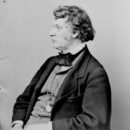All states are not created equal, at least not when it comes to their influence on American history. That assumption underlies a new volume of essays called Massachusetts and the Civil War. New England Public Radio’s Carrie Healy spoke with one of its editors, Conrad Edick Wright, who says Massachusetts seems to be the single most important state responsible for the causes, and to some extent the consequences, of pre-and post- war order.



